最新情态动词语法填空48556
高考英语新情态动词知识点全集汇编附答案(4)
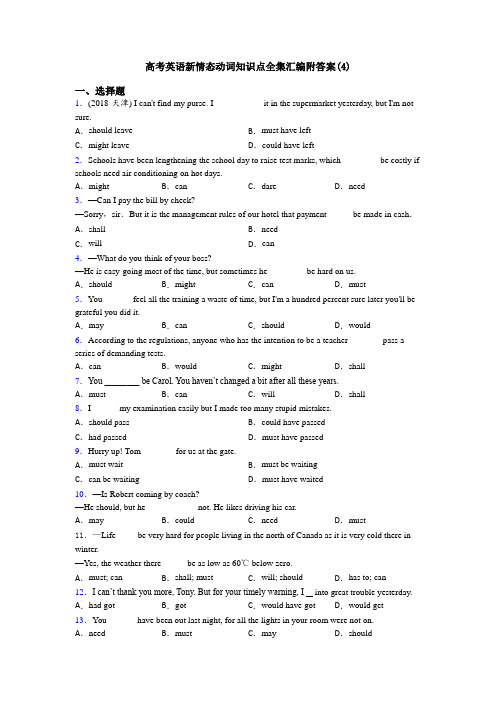
高考英语新情态动词知识点全集汇编附答案(4)一、选择题1.(2018·天津) I can't find my purse. I___________ it in the supermarket yesterday, but I'm not sure.A.should leave B.must have leftC.might leave D.could have left2.Schools have been lengthening the school day to raise test marks, which ________ be costly if schools need air conditioning on hot days.A.might B.can C.dare D.need3.—Can I pay the bill by check?—Sorry,sir.But it is the management rules of our hotel that payment _____ be made in cash.A.shall B.needC.will D.can4.—What do you think of your boss?—He is easy-going most of the time, but sometimes he ________ be hard on us.A.should B.might C.can D.must5.You ______ feel all the training a waste of time, but I'm a hundred percent sure later you'll be grateful you did it.A.may B.can C.should D.would 6.According to the regulations, anyone who has the intention to be a teacher _______ pass a series of demanding tests.A.can B.would C.might D.shall7.You ________ be Carol. You haven’t changed a bit after all these years.A.must B.can C.will D.shall8.I ______my examination easily but I made too many stupid mistakes.A.should pass B.could have passedC.had passed D.must have passed9.Hurry up! Tom _______ for us at the gate.A.must wait B.must be waitingC.can be waiting D.must have waited10.—Is Robert coming by coach?—He should, but he ___________ not. He likes driving his car.A.may B.could C.need D.must11.—Life ____ be very hard for people living in the north of Canada as it is very cold there in winter.—Yes, the weather there _____ be as low as 60℃ below zero.A.must; can B.shall; must C.will; should D.has to; can12.I can’t thank you more, Tony. But for your timely warning, I into great trouble yesterday. A.had got B.got C.would have got D.would get 13.You ______ have been out last night, for all the lights in your room were not on.A.need B.must C.may D.should14.The heavy rain may ______ the landslide last night.A.accounts for B.accounted forC.have accounted for D.accounting for15.I still remember my happy childhood when my mother ___________ take me to Disneyland at weekends.A.might B.mustC.would D.should16.—I’m sorry, I ________ have been so rude to you that way.—Forget it, but I was a bit out of control yesterday.A.mustn’t B.shouldn’tC.couldn’t D.needn’t17.(2018·北京) In today’s information age, the loss of data _________ cause serious problems for a company.A.need B.shouldC.can D.must18.The weather turned out to be fine yesterday. I ____________ the trouble to carry my umbrella with me.A.should have taken B.could have takenC.needn’t have taken D.mustn’t have taken19.The lady ________ have done something wrong, because she is looking guilty.A.would B.should C.can D.must20.Tom told us that he ______ come to the party tonight, but he wasn’t sure a bout this. A.will B.would C.could D.might21.— Did Bob take the job in the supermarket? — No, but I think he _________.A.will have B.may have C.should have D.must have 22.—Jane, why don’t you take a bite of the chocolate?—Well, I am on diet, if you __________know.A.must B.shall C.would D.could23.He plays basketball very well. He_________ it a lot.A.may practise B.must practiseC.must have practised D.should have practiced24.I____________ go to a summer camp during the summer vacation, but I am not sure. A.might B.can C.must D.need25.You don’t look well, you __________ see the doctor.A.ought to B.mayC.can D.might【参考答案】***试卷处理标记,请不要删除一、选择题1.D解析:D【解析】【详解】考查情态动词表推测。
高中情态动词讲解及练习

高中情态动词讲解及练习预览说明:预览图片所展示的格式为文档的源格式展示,下载源文件没有水印,内容可编辑和复制情态动词情态助动词有十三个:may, might; can, could; will, would; shall, should; must, need, dare, used to, ought to. ·情态动词的语法特征1)情态动词不能单独做谓语,除ought 和have 外,后面只能接不带to 的不定式。
2)情态动词没有人称,数的变化,但有些情态动词,如can、will也有一般式和过去式的变化。
3)情态动词的“时态”形式并不是时间区别的主要标志,不少情况下,情态动词的现在式形式和过去式形式都可用来表示现在时间、过去时间和将来时间。
一.can, could 和be able to的用法1.can, be able to都可表示“能力”Can的主语是人或物,表客观的能力,be able to的主语是人表通过主观的努力,能够……She can/be able to sing the song in English.This machine can make you feel comfortable.2.can只用于现在式和过去式(could)。
be able to可以用于各种时态。
We’ll be able to finish the work soon.I haven’t been able to see the film.could用于表示泛指过去的能力。
如:I could read when I was four.Although the soldier was badly wounded, he was able to tell what had happened.She ran fast but she couldn’t /wasn’t able to catch the bus.3.表示特定的某一过去能力或表示成功地做了某事时,只能用was/were able to,不能用could。
(完整版)情态动词语法填空
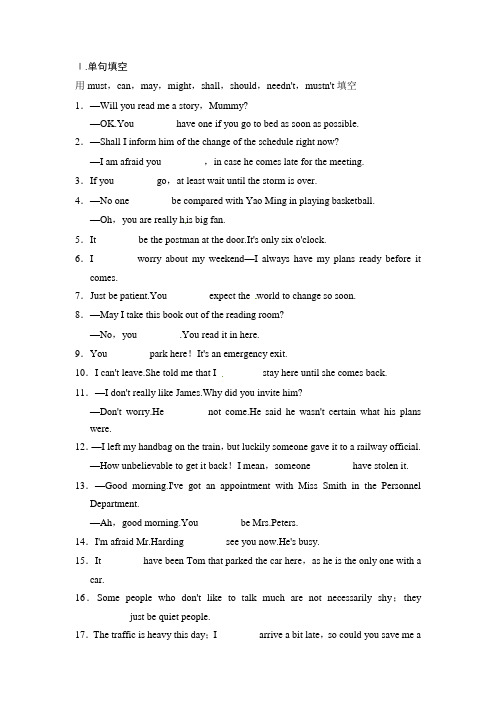
Ⅰ.单句填空用must,can,may,might,shall,should,needn't,mustn't填空1.—Will you read me a story,Mummy?—OK.You ________have one if you go to bed as soon as possible.2.—Shall I inform him of the change of the schedule right now?—I am afraid you ________,in case he comes late for the meeting.3.If you ________go,at least wait until the storm is over.4.—No one ________be compared with Yao Ming in playing basketball.—Oh,you are really h is big fan.5.It ________be the postman at the door.It's only six o'clock.6.I ________worry about my weekend—I always have my plans ready before it comes.7.Just be patient.You ________expect the world to change so soon.8.—May I take this book out of the reading room?—No,you ________.You read it in here.9.You ________park here!It's an emergency exit.10.I can't leave.She told me that I ________stay here until she comes back. 11.—I don't really like James.Why did you invite him?—Don't worry.He ________not come.He said he wasn't certain what his plans were.12.—I left my handbag on the train,but luckily someone gave it to a railway official.—How unbelievable to get it back!I mean,someone ________have stolen it. 13.—Good morning.I've got an appointment with Miss Smith in the Personnel Department.—Ah,good morning.You ________be Mrs.Peters.14.I'm afraid Mr.Harding ________see you now.He's busy.15.It ________have been Tom that parked the car here,as he is the only one with a car.16.Some people who don't like to talk much are not necessarily shy;they ________just be quiet people.17.The traffic is heavy this day;I ________arrive a bit late,so could you save me aplace?18.What do you mean,there are only ten tickets?There ________be twelve. 19.—Hi,Tom.Any idea where Jane is?—She ________be in the classroom.I saw her there just now.20.It is usually warm in my hometown in March,but it ________be rather cold sometimes.答案 1.shall 2.must 3.must 4.can 5.can't6.needn't7.can't8.mustn't9.mustn't10.must11.may/might12.might/could13.must14.can't15.must16.may17.might18.should19.must20.canⅡ.语篇填空,在空格处填入适当的情态动词,使上下文意义通顺Despite the fact that you __1__wear school uniform every day,you __2__still find yourself a place at the cutting edge(领先地位)of fashion.From coloured shoelaces to special snacks (零食),this is what the cool kids in your class believe in for the summer.It __3__not be practical for you to have a new pair of shoes every day,but moving from one colour shoelaces to another __4__show your desire for a new look.Bright colours—red,green,light gold,pink,purple,are the top choices.There are also sports laces that come in colour combinations,such as red/white and red/black.You __5__even try to lace up your sports shoes in two colours!Has changing cell phone accessories(小挂件)become part of your life?Although you __6__not be able to afford the most advanced phone,you __7__still decorate it.Girls __8__prefer fluffy(毛茸茸的)Teddy Bears that change colour according to the temperature,while many boys like taking accessories that say things such as “The teacher is coming.”Try sticking photos(大头照).They are cheap,convenient and __9__be carried around in your wallet.You __10__even choose special backgrounds of cartoon figures to show your individuality(个性).答案 1.have to 2.can 3.may 4.can/will 5.can/may6.may 7.can 8.may 9.can 10.can/may。
高考英语新情态动词知识点单元汇编及答案
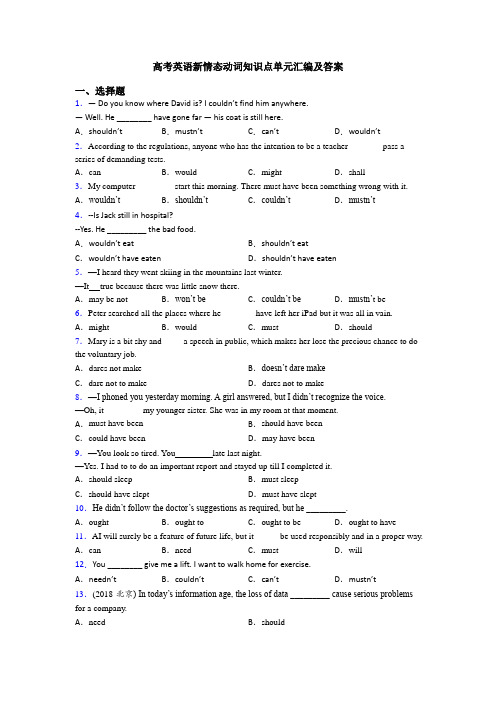
高考英语新情态动词知识点单元汇编及答案一、选择题1.—Do you know where David is? I couldn’t find him anywhere.— Well. He ________ have gone far — his coat is still here.A.shouldn’t B.mustn’t C.can’t D.wouldn’t 2.According to the regulations, anyone who has the intention to be a teacher _______ pass a series of demanding tests.A.can B.would C.might D.shall3.My computer ________ start this morning. There must have been something wrong with it. A.wouldn’t B.shouldn’t C.couldn’t D.mustn’t4.--Is Jack still in hospital?--Yes. He _________ the bad food.A.wouldn’t eat B.shouldn’t eatC.wouldn’t have eaten D.shouldn’t have eaten5.—I heard they went skiing in the mountains last winter.—It true because there was little snow there.A.may be not B.won’t be C.couldn’t be D.mustn’t be 6.Peter searched all the places where he________have left her iPad but it was all in vain. A.might B.would C.must D.should7.Mary is a bit shy and ____ a speech in public, which makes her lose the precious chance to do the voluntary job.A.dares not make B.doesn’t dare makeC.dare not to make D.dares not to make8.—I phoned you yesterday morning. A girl answered, but I didn’t recognize the voice.—Oh, it ________ my younger sister. She was in my room at that moment.A.must have been B.should have beenC.could have been D.may have been9.—You look so tired. You________ late last night.—Yes. I had to to do an important report and stayed up till I completed it.A.should sleep B.must sleepC.should have slept D.must have slept10.He didn’t follow the doctor’s suggestions as required, but he _________.A.ought B.ought to C.ought to be D.ought to have 11.AI will surely be a feature of future life, but it _____ be used responsibly and in a proper way. A.can B.need C.must D.will12.You ________ give me a lift. I want to walk home for exercise.A.needn’t B.couldn’t C.can’t D.mustn’t 13.(2018·北京) In today’s information age, the loss of data _________ cause serious problems for a company.A.need B.shouldC.can D.must14.He did not regret saying what he did but felt that he _________ it differently.A.could express B.would expressC.could have expressed D.must have expressed15.The girl _________ out alone at night.A.dare not go B.dare not to go C.dares not go D.not dare go 16.You _________ me about it earlier, but you didn't.A.should have told B.would have toldC.must have told D.should tell17.It’s nearly 7 o’clock. Jack ____________ be here at any moment.A.shall B.had toC.ought to D.have to18.—Peter, you delivered a wonderful speech today.—Thanks, but I think I ______ more attention to my stage manners during that time.A.must pay B.should payC.must have paid D.should have paid19.—Jane, why don’t you take a bite of the chocolate?—Well, I am on diet, if you __________know.A.must B.shall C.would D.could20.T here’s no light on --- they _______ be at home.A.can’t B.mustn’t C.needn’t D.wouldn’t 21.Word that you _________ enjoy a three-day holiday has come if you do complete the task on time.A.may B.should C.could D.shall22.—Is there a holiday recently?—There_____ be. It has been informed that we will continue to study for another three weeks. A.won’t B.mustn’t C.may not D.can’t23.—Do you know where Tony is?—He _________ in the living room. I saw him there just now.A.shall be B.should have been C.might have been D.must be 24.—Sorry, Mum! I failed the job interview again.—Oh, it's too bad. You________ have made full preparations.A.must B.can C.would D.should25.—I’m sorry, I ________ have been so rude to you that way.—Forget it, but I was a bit out of control yesterday.A.mustn’t B.shouldn’tC.couldn’t D.needn’t【参考答案】***试卷处理标记,请不要删除一、选择题1.C解析:C【解析】【分析】【详解】试考查情态动词。
高考英语新情态动词知识点全集汇编及答案(1)
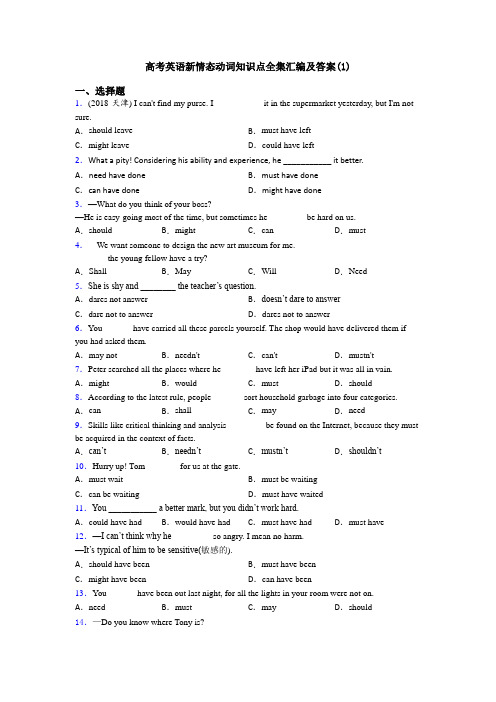
高考英语新情态动词知识点全集汇编及答案(1)一、选择题1.(2018·天津) I can't find my purse. I___________ it in the supermarket yesterday, but I'm not sure.A.should leave B.must have leftC.might leave D.could have left2.What a pity! Considering his ability and experience, he ___________ it better.A.need have done B.must have doneC.can have done D.might have done3.—What do you think of your boss?—He is easy-going most of the time, but sometimes he ________ be hard on us.A.should B.might C.can D.must4.---We want someone to design the new art museum for me.---_____ the young fellow have a try?A.Shall B.May C.Will D.Need5.She is shy and ________ the teacher’s question.A.dares not answer B.doesn’t dare to answerC.dare not to answer D.dares not to answer6.You ______ have carried all these parcels yourself. The shop would have delivered them if you had asked them.A.may not B.needn't C.can't D.mustn't7.Peter searched all the places where he________have left her iPad but it was all in vain. A.might B.would C.must D.should 8.According to the latest rule, people _______sort household garbage into four categories. A.can B.shall C.may D.need9.Skills like critical thinking and analysis ________ be found on the Internet, because they must be acquired in the context of facts.A.can’t B.needn’t C.mustn’t D.shouldn’t 10.Hurry up! Tom _______ for us at the gate.A.must wait B.must be waitingC.can be waiting D.must have waited11.You ___________ a better mark, but you didn’t work hard.A.could have had B.would have had C.must have had D.must have12.—I can’t think why he________ so angry. I mean no harm.—It’s typical of him to be sensitive(敏感的).A.should have been B.must have beenC.might have been D.can have been13.You ______ have been out last night, for all the lights in your room were not on.A.need B.must C.may D.should14.—Do you know where Tony is?—He _________ in the living room. I saw him there just now.A.shall be B.should have been C.might have been D.must be 15.Louis Cha (金庸) passed away. As for his achievement, there is such a comment, “He ______ the Nobel Prize for Literature with his written works translated into English.”A.could have been rewarded B.must have been rewardedC.should be rewarded D.need have been rewarded16.–Do you know where David is? He is not in the office.–Well, he ______ have gone far—his coat is still here.A.shouldn’t B.mustn’t C.can’t D.wouldn’t17.AI will surely be a feature of future life, but it _____ be used responsibly and in a proper way. A.can B.need C.must D.will 18.(2018·北京) In today’s info rmation age, the loss of data _________ cause serious problems for a company.A.need B.shouldC.can D.must19.------ Tom is never late for work. Why is he absent today?------ Something _________ to him.A.must happen B.should have happenedC.could have happened D.must have happened20.The lady ________ have done something wrong, because she is looking guilty.A.would B.should C.can D.must21.You _________ me about it earlier, but you didn't.A.should have told B.would have toldC.must have told D.should tell22.Tom told us that he ______ come to the party tonight, but he wasn’t sure about this.A.will B.would C.could D.might23.Word that you _________ enjoy a three-day holiday has come if you do complete the task on time.A.may B.should C.could D.shall24.As you worked late last night, you __________ have come this morning.A.may not B.can’t C.mustn’t D.needn’t25.Mary is a bit shy and ____ a speech in public, which makes her lose the precious chance to do the voluntary job.A.dares not make B.doesn’t dare m akeC.dare not to make D.dares not to make【参考答案】***试卷处理标记,请不要删除一、选择题1.D解析:D【解析】【详解】考查情态动词表推测。
人教版英语初二 英语情态动词填空练习题及解析
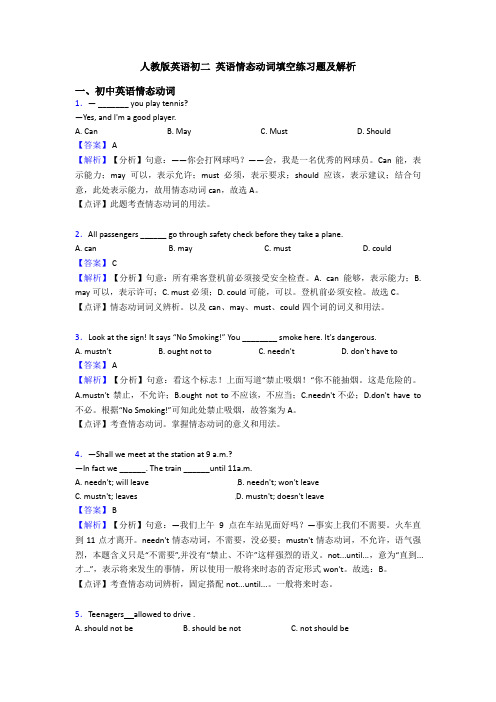
人教版英语初二英语情态动词填空练习题及解析一、初中英语情态动词1.— _______ you play tennis?—Yes, and I'm a good player.A. CanB. MayC. MustD. Should【答案】 A【解析】【分析】句意:——你会打网球吗?——会,我是一名优秀的网球员。
Can能,表示能力;may可以,表示允许;must必须,表示要求;should应该,表示建议;结合句意,此处表示能力,故用情态动词can,故选A。
【点评】此题考查情态动词的用法。
2.All passengers ______ go through safety check before they take a plane.A. canB. mayC. mustD. could【答案】 C【解析】【分析】句意:所有乘客登机前必须接受安全检查。
A. can能够,表示能力;B. may可以,表示许可;C. must必须;D. could可能,可以。
登机前必须安检。
故选C。
【点评】情态动词词义辨析。
以及can、may、must、could四个词的词义和用法。
3.Look at the sign! It says “No Smoking!” You ________ smoke here. It's dangerous.A. mustn'tB. ought not toC. needn'tD. don't have to【答案】 A【解析】【分析】句意:看这个标志!上面写道“禁止吸烟!“你不能抽烟。
这是危险的。
A.mustn't 禁止,不允许;B.ought not to不应该,不应当;C.needn't不必;D.don't have to 不必。
根据“No Smoking!”可知此处禁止吸烟,故答案为A。
【点评】考查情态动词。
掌握情态动词的意义和用法。
情态动词语法填空108页PPT

1、战鼓一响,法律无声。——英国 2、任何法律的根本;不,不成文法本 身就是 讲道理 ……法 律,也 ----即 明示道 理。— —爱·科 克
3、法律是最保险的头盔。——爱·科 克 4、一个国家如果纲纪不正,其国风一 定颓败 。—— 塞内加 5、法律不能使人人平等,但是在法律 面前人 源泉吸 收都不可耻。——阿卜·日·法拉兹
42、只有在人群中间,才能认识自 己。——德国
43、重复别人所说的话,只需要教育; 而要挑战别人所说的话,则需要头脑。—— 玛丽·佩蒂博恩·普尔
44、卓越的人一大优点是:在不利与艰 难的遭遇里百折不饶。——贝多芬
45、自己的饭量自己知道。——苏联
高考英语新情态动词知识点分类汇编及答案(1)
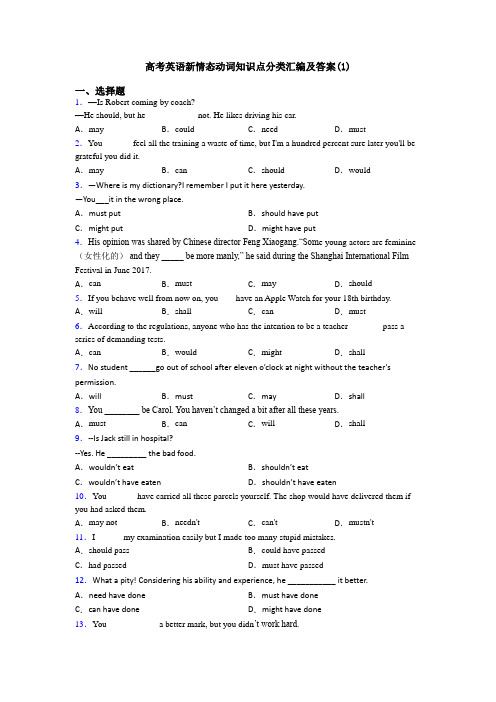
高考英语新情态动词知识点分类汇编及答案(1)一、选择题1.—Is Robert coming by coach?—He should, but he ___________ not. He likes driving his car.A.may B.could C.need D.must2.You ______ feel all the training a waste of time, but I'm a hundred percent sure later you'll be grateful you did it.A.may B.can C.should D.would 3.—Where is my dictionary?I remember I put it here yesterday.—You___it in the wrong place.A.must put B.should have putC.might put D.might have put4.His opinion was shared by Chinese director Feng Xiaogang.“Som e young actors are feminine (女性化的)and they _____ be more manly,” he said during the Shanghai International Film Festival in June 2017.A.can B.must C.may D.should5.If you behave well from now on, you ___ have an Apple Watch for your 18th birthday. A.will B.shall C.can D.must 6.According to the regulations, anyone who has the intention to be a teacher _______ pass a series of demanding tests.A.can B.would C.might D.shall7.No student ______go out of school after eleven o’clock at night without the teacher’s permission.A.will B.must C.may D.shall8.You ________ be Carol. You haven’t changed a bit after all these years.A.must B.can C.will D.shall9.--Is Jack still in hospital?--Yes. He _________ the bad food.A.wouldn’t eat B.shouldn’t eatC.wouldn’t have eaten D.shouldn’t have eaten10.You ______ have carried all these parcels yourself. The shop would have delivered them if you had asked them.A.may not B.needn't C.can't D.mustn't11.I ______my examination easily but I made too many stupid mistakes.A.should pass B.could have passedC.had passed D.must have passed12.What a pity! Considering his ability and experience, he ___________ it better.A.need have done B.must have doneC.can have done D.might have done13.You ___________ a better mark, but you didn’t work hard.A.could have had B.would have had C.must have had D.must have 14.As you worked late last night, you __________ have come this morning.A.may not B.can’t C.mustn’t D.needn’t15.—I phoned you yesterday morning. A girl answered, but I didn’t rec ognize the voice.—Oh, it ________ my younger sister. She was in my room at that moment.A.must have been B.should have beenC.could have been D.may have been16.—You look so tired. You________ late last night.—Yes. I had to to do an important report and stayed up till I completed it.A.should sleep B.must sleepC.should have slept D.must have slept17.She looks very happy. She_________ the exam.A.can have passed B.should have passed C.must have passed D.could have passed 18.—I’m sorry, I ________ have been so rude to you that way.—Forget it, but I was a bit out of control yesterday.A.mustn’t B.shouldn’tC.couldn’t D.needn’t19.One of our rules is that every student _______ wear school uniform while at school. A.might B.couldC.shall D.will20.The girl _________ out alone at night.A.dare not go B.dare not to go C.dares not go D.not dare go 21.You _________ me about it earlier, but you didn't.A.should have told B.would have toldC.must have told D.should tell22.It’s nearly 7 o’clock. Jack ____________ b e here at any moment.A.shall B.had toC.ought to D.have to23.—Peter, you delivered a wonderful speech today.—Thanks, but I think I ______ more attention to my stage manners during that time. A.must pay B.should payC.must have paid D.should have paid24.—Can I inform my best friends of the result?—No, I want to keep it a secret . You ____tell anyone.A.won't B.don't have to C.mustn't D.don't need to 25.Hurry up! Tom _______ for us at the gate.A.must wait B.must be waitingC.can be waiting D.must have waited【参考答案】***试卷处理标记,请不要删除一、选择题1.A解析:A【解析】【详解】考查情态动词。
高考英语新情态动词知识点分类汇编附答案
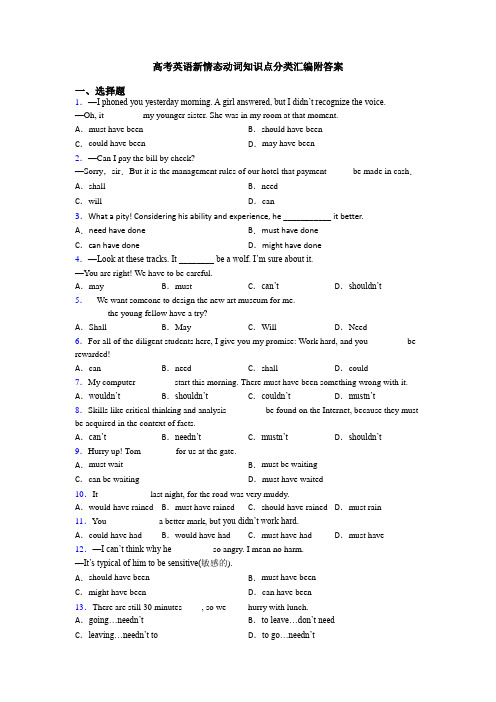
高考英语新情态动词知识点分类汇编附答案一、选择题1.—I phoned you yesterday morning. A girl answered, but I didn’t recognize the voice.—Oh, it ________ my younger sister. She was in my room at that moment.A.must have been B.should have beenC.could have been D.may have been2.—Can I pay the bill by check?—Sorry,sir.But it is the management rules of our hotel that payment _____ be made in cash.A.shall B.needC.will D.can3.What a pity! Considering his ability and experience, he ___________ it better.A.need have done B.must have doneC.can have done D.might have done4.—Look at these tracks. It ________ be a wolf. I’m sure about it.—You are right! We have to be careful.A.may B.must C.can’t D.shouldn’t5.---We want someone to design the new art museum for me.---_____ the young fellow have a try?A.Shall B.May C.Will D.Need6.For all of the diligent students here, I give you my promise: Work hard, and you ________ be rewarded!A.can B.need C.shall D.could7.My computer ________ start this morning. There must have been something wrong with it. A.wouldn’t B.shouldn’t C.couldn’t D.mustn’t8.Skills like critical thinking and analysis ________ be found on the Internet, because they must be acquired in the context of facts.A.can’t B.needn’t C.mustn’t D.shouldn’t 9.Hurry up! Tom _______ for us at the gate.A.must wait B.must be waitingC.can be waiting D.must have waited10.It ___________ last night, for the road was very muddy.A.would have rained B.must have rained C.should have rained D.must rain 11.You ___________ a better mark, bu t you didn’t work hard.A.could have had B.would have had C.must have had D.must have12.—I can’t think why he________ so angry. I mean no harm.—It’s typical of him to be sensitive(敏感的).A.should have been B.must have beenC.might have been D.can have been13.There are still 30 minutes ____, so we ____ hurry with lunch.A.going…needn’t B.to leave…don’t need C.leaving…needn’t to D.to go…needn’t14.You________have scolded him for his poor performance.After all,he had done his best. A.wouldn’t B.couldn’t C.m ustn’t D.shouldn’t 15.—You look so tired. You________ late last night.—Yes. I had to to do an important report and stayed up till I completed it.A.should sleep B.must sleepC.should have slept D.must have slept16.One of our rules is that every student _______ wear school uniform while at school. A.might B.couldC.shall D.will17.Tom told us that he ______ come to the party tonight, but he wasn’t sure about this. A.will B.would C.could D.might18.We lost our way in that small village, otherwise we ________more places of interest yesterday.A.visited B.had visitedC.would visit D.would have visited19.—Can I inform my best friends of the result?—No, I want to keep it a secret . You ____tell anyone.A.won't B.don't have to C.mustn't D.don't need to 20.There’s no light on --- they _______ be at home.A.can’t B.mustn’t C.needn’t D.wouldn’t 21.He plays basketball very well. He_________ it a lot.A.may practise B.must practiseC.must have practised D.should have practiced22.I _________ my driving test but I did n’t operate carefully.A.should pass B.may passC.might have passed D.might pass23.—Is there a holiday recently?—There_____ be. It has been informed that we will continue to study for another three weeks. A.won’t B.mustn’t C.may not D.can’t24.As you worked late last night, you __________ have come this morning.A.may not B.can’t C.mustn’t D.needn’t 25.—Life ____ be very hard for people living in the north of Canada as it is very cold there in winter.—Yes, the weather there _____ be as low as 60℃ below zero.A.must; can B.shall; must C.will; should D.has to; can 【参考答案】***试卷处理标记,请不要删除一、选择题1.A解析:A【解析】【分析】【详解】考查情态动词。
2024年高考英语情态动词语法专题

2024年高考英语情态动词语法专题(实用版)编制人:__审核人:__审批人:__编制单位:__编制时间:__年__月__日序言下载提示:该文档是本店铺精心编制而成的,希望大家下载后,能够帮助大家解决实际问题。
文档下载后可定制修改,请根据实际需要进行调整和使用,谢谢!并且,本店铺为大家提供各种类型的实用资料,如工作总结、述职报告、心得体会、工作计划、演讲稿、教案大全、作文大全、合同范文、活动方案、其他资料等等,想了解不同资料格式和写法,敬请关注!Download tips: This document is carefully compiled by this editor.I hope that after you download it, it can help you solve practical problems. The document can be customized and modified after downloading, please adjust and use it according to actual needs, thank you!And, this store provides various types of practical materials for everyone, such as work summaries, job reports, insights, work plans, speeches, lesson plans, essays, contract samples, activity plans, and other materials. If you want to learn about different data formats and writing methods, please pay attention!2024年高考英语情态动词语法专题2024年高考英语情态动词语法专题(精选2篇) 2024年高考英语情态动词语法专题篇1XX年《高考风向标》•英语目录第一部分教材梳理必修一unit 1、friendship单元要点预览语言要点词语辨析词性变化重点单词重点词组重点句子课文要点课文词汇填空课文大意概括课文佳句背诵与仿写单元自测unit 2、english around the world单元要点预览语言要点词语辨析词性变化重点单词重点词组重点句子课文要点课文词汇填空课文大意概括课文佳句背诵与仿写单元自测unit 3、travel journal 单元要点预览语言要点词语辨析词性变化重点单词重点词组重点句子课文要点课文词汇填空课文大意概括课文佳句背诵与仿写单元自测unit 4、earthquakes单元要点预览语言要点词语辨析词性变化重点单词重点词组重点句子课文要点课文词汇填空课文大意概括课文佳句背诵与仿写单元自测unit 5 nelson mandela—a modern hero 单元要点预览语言要点词语辨析词性变化重点单词重点词组重点句子课文要点课文词汇填空课文大意概括课文佳句背诵与仿写单元自测必修二unit 1、cultural relics 单元要点预览语言要点词语辨析词性变化重点单词重点词组重点句子课文要点课文词汇填空课文大意概括课文佳句背诵与仿写单元自测unit 2、the olympic games单元要点预览语言要点词语辨析词性变化重点单词重点词组重点句子课文要点课文词汇填空课文大意概括课文佳句背诵与仿写单元自测unit 3、computers 单元要点预览语言要点词语辨析词性变化重点单词重点词组重点句子课文要点课文词汇填空课文大意概括课文佳句背诵与仿写单元自测unit 4、wildlife protection 单元要点预览语言要点词语辨析词性变化重点单词重点词组重点句子课文要点课文词汇填空课文大意概括课文佳句背诵与仿写单元自测unit 5 music单元要点预览语言要点词语辨析词性变化重点单词重点词组重点句子课文要点课文词汇填空课文大意概括课文佳句背诵与仿写单元自测必修三unit 1、festivals around the world 单元要点预览语言要点词语辨析词性变化重点单词重点词组重点句子课文要点课文词汇填空课文大意概括课文佳句背诵与仿写单元自测unit 2、healthy eating单元要点预览语言要点词语辨析词性变化重点单词重点词组重点句子课文要点课文词汇填空课文大意概括课文佳句背诵与仿写单元自测unit 3、the million pound bank note 单元要点预览语言要点词语辨析词性变化重点单词重点词组重点句子课文要点课文词汇填空课文大意概括课文佳句背诵与仿写单元自测第二部分语法专题专题一、冠词专题二、名词专题三、代词专题四数词专题五形容词和副词专题六介词专题七情态动词专题八非谓语动词专题九动词和动词短语专题十动词的时态专题十一、动词的语态专题十二、句子种类专题十三、名词性从句专题十四定语从句专题十五状语从句专题十六倒装句和省略句专题十七强调句专题十八虚拟语气专题十九主谓一致专题二十直接引语和间接引语第三部分高考题型讲练听力完形填空语法填空阅读理解信息匹配基础写作读写任务第二部分语法专题版权所有:专题七情态动词i、重点难点解析情态动词的高考命题导向:情态动词表示说话者的情感和态度,有一定的含义,但是不能单独做谓语,必须与其他动词连用。
人教版英语初二 英语情态动词填空练习题附解析
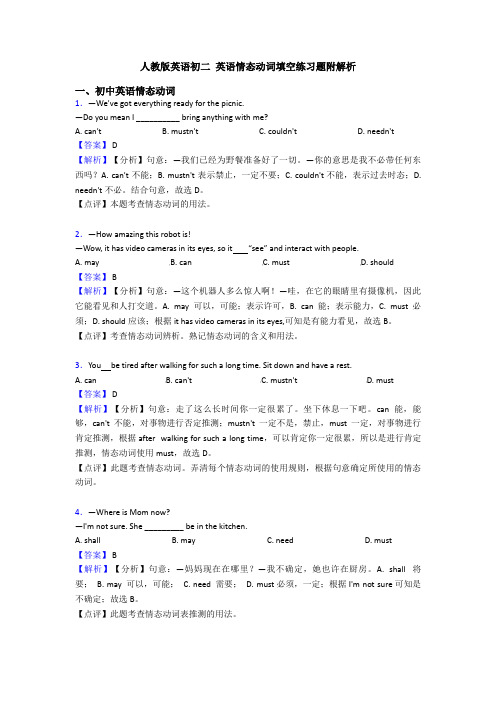
人教版英语初二英语情态动词填空练习题附解析一、初中英语情态动词1.—We've got everything ready for the picnic.—Do you mean I __________ bring anything with me?A. can'tB. mustn'tC. couldn'tD. needn't【答案】 D【解析】【分析】句意:—我们已经为野餐准备好了一切。
—你的意思是我不必带任何东西吗?A. can't 不能;B. mustn't 表示禁止,一定不要;C. couldn't不能,表示过去时态;D. needn't不必。
结合句意,故选D。
【点评】本题考查情态动词的用法。
2.—How amazing this robot is!—Wow, it has video cameras in its eyes, so it “see” and interact with people.A. mayB. canC. mustD. should【答案】 B【解析】【分析】句意:—这个机器人多么惊人啊!—哇,在它的眼睛里有摄像机,因此它能看见和人打交道。
A. may 可以,可能;表示许可,B. can 能;表示能力,C. must 必须;D. should应该;根据it has video cameras in its eyes,可知是有能力看见,故选B。
【点评】考查情态动词辨析。
熟记情态动词的含义和用法。
3.You be tired after walking for such a long time. Sit down and have a rest.A. canB. can'tC. mustn'tD. must【答案】 D【解析】【分析】句意:走了这么长时间你一定很累了。
坐下休息一下吧。
高考英语最新情态动词知识点基础测试题及答案(4)

高考英语最新情态动词知识点基础测试题及答案(4)一、选择题1.—I phoned you yesterday morning. A girl answered, but I didn’t recognize the voice.—Oh, it ________ my younger sister. She was in my room at that moment.A.must have been B.should have beenC.could have been D.may have been2.—I can’t think why he________ so angry. I mean no harm.—It’s typical of him to be sensitive(敏感的).A.should have been B.must have beenC.might have been D.can have been3.Schools have been lengthening the school day to raise test marks, which ________ be costly if schools need air conditioning on hot days.A.might B.can C.dare D.need4.Tourists who enter the quiet area _____ obey the rule to reduce any potential effect on the environment.A.can B.may C.shall D.dare5.—What do you think of your boss?—He is easy-going most of the time, but sometimes he ________ be hard on us.A.should B.might C.can D.must6.They worked hard day and night during the next ten years ________ they ________ pay for the lost necklace.A.so…would B.so that…would C.in order tha t…could D.and…would7.---We want someone to design the new art museum for me.---_____ the young fellow have a try?A.Shall B.May C.Will D.Need8.You ________ give me a lift. I want to walk home for exercise.A.needn’t B.couldn’t C.can’t D.mustn’t 9.According to the regulations, anyone who has the intention to be a teacher _______ pass a series of demanding tests.A.can B.would C.might D.shall10.-Jenny took the 8:00 bus to Guangzhou this morning.-Really? He__the 9:00 train. It's much more comfortable and safer to travel by train. A.could have taken B.should takeC.must have taken D.can take11.—Is Robert coming by coach?—He should, but he ___________ not. He likes driving his car.A.may B.could C.need D.must12.I can’t thank you more, Tony. But for your timely warning, I into great trouble yesterday. A.had got B.got C.would have got D.would get 13.There are still 30 minutes ____, so we ____ hurry with lunch.A.going…needn’t B.to leave…don’t needC.leaving…needn’t to D.to go…needn’t14.—Sorry, Mum! I failed the job interview again.—Oh, it's too bad. You________ have made full preparations.A.must B.can C.would D.should 15.She looks very happy. She_________ the exam.A.can have passed B.should have passed C.must have passed D.could have passed 16.—I’m sorry, I ________ have been so rude to you that way.—Forget it, but I was a bit out of control yesterday.A.mustn’t B.shouldn’tC.couldn’t D.needn’t17.He ______ writing the paper now. He hadn’t written a single word when I left him ten minutes ago.A.shou ldn’t be B.can’t have finishedC.can’t be D.mustn’t have finished18.You _________ me about it earlier, but you didn't.A.should have told B.would have toldC.must have told D.should tell19.Tom told us that he ______ come to the party tonight, but he wasn’t sure about this. A.will B.would C.could D.might20.— Did Bob take the job in the supermarket? — No, but I think he _________.A.will have B.may have C.should have D.must have 21.It’s nearly 7 o’clock. Jack ____________ be here at any moment.A.shall B.had toC.ought to D.have to22.There’s no light on --- they _______ be at home.A.can’t B.mustn’t C.needn’t D.wouldn’t23.I____________ go to a summer camp during the summer vacation, but I am not sure. A.might B.can C.must D.need24.As you worked late last night, you __________ have come this morning.A.may not B.can’t C.mustn’t D.needn’t 25.Although you ______ find bargains in London, it’s not generally a cheap place to shop. A.should B.need C.must D.can【参考答案】***试卷处理标记,请不要删除一、选择题1.A解析:A【解析】【分析】【详解】考查情态动词。
高考英语新情态动词知识点全集汇编附答案(1)
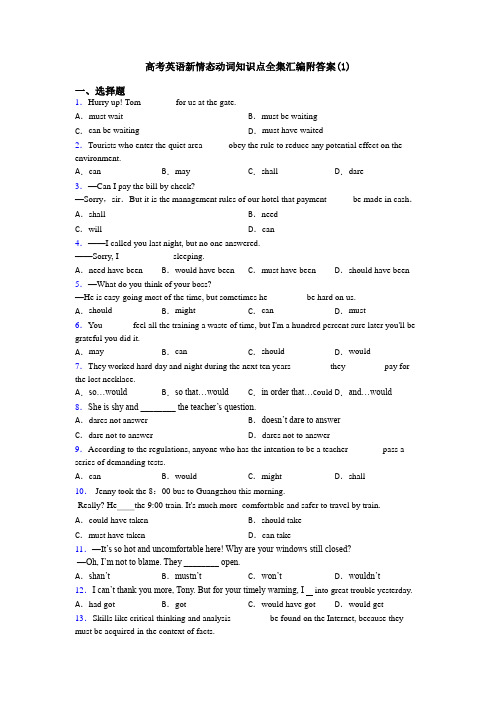
高考英语新情态动词知识点全集汇编附答案(1)一、选择题1.Hurry up! Tom _______ for us at the gate.A.must wait B.must be waitingC.can be waiting D.must have waited2.Tourists who enter the quiet area _____ obey the rule to reduce any potential effect on the environment.A.can B.may C.shall D.dare3.—Can I pay the bill by check?—Sorry,sir.But it is the management rules of our hotel that payment _____ be made in cash.A.shall B.needC.will D.can4.——I called you last night, but no one answered.——Sorry, I____________ sleeping.A.need have been B.would have been C.must have been D.should have been 5.—What do you think of your boss?—He is easy-going most of the time, but sometimes he ________ be hard on us.A.should B.might C.can D.must6.You ______ feel all the training a waste of time, but I'm a hundred percent sure later you'll be grateful you did it.A.may B.can C.should D.would7.They worked hard day and night during the next ten years ________ they ________ pay for the lost necklace.A.so…would B.so that…would C.in order that…c ould D.and…would 8.She is shy and ________ the teacher’s question.A.dares not answer B.doesn’t dare to answerC.dare not to answer D.dares not to answer9.According to the regulations, anyone who has the intention to be a teacher _______ pass a series of demanding tests.A.can B.would C.might D.shall10.-Jenny took the 8:00 bus to Guangzhou this morning.-Really? He__the 9:00 train. It's much more comfortable and safer to travel by train. A.could have taken B.should takeC.must have taken D.can take11.—I t’s so hot and uncomfortable here! Why are your windows still closed?—Oh, I’m not to blame. They ________ open.A.shan’t B.mustn’t C.won’t D.wouldn’t12.I can’t thank you more, Tony. But for your timely warning, I into great trouble yesterday. A.had got B.got C.would have got D.would get 13.Skills like critical thinking and analysis ________ be found on the Internet, because they must be acquired in the context of facts.A.can’t B.needn’t C.mustn’t D.shouldn’t14.He did not regret saying what he did but felt that he _________ it differently.A.could express B.would expressC.could have expressed D.must have expressed15.You ______ have been out last night, for all the lights in your room were not on.A.need B.must C.may D.should16.AI will surely be a feature of future life, but it _____ be used responsibly and in a proper way. A.can B.need C.must D.will17.------ Tom is never late for work. Why is he absent today?------ Something _________ to him.A.must happen B.should have happenedC.could have happened D.must have happened18.— Did Bob take the job in the supermarket? — No, but I think he _________.A.will have B.may have C.should have D.must have 19.—Can I inform my best friends of the result?—No, I want to keep it a secret . You ____tell anyone.A.won't B.don't have to C.mustn't D.don't need to20.I____________ go to a summer camp during the summer vacation, but I am not sure. A.might B.can C.must D.need21.I _________ my driving test but I didn’t operate carefully.A.should pass B.may passC.might have passed D.might pass22.—Do you know where Tony is?—He _________ in the living room. I saw him there just now.A.shall be B.should have been C.might have been D.must be23.It was so noisy that we hear ourselves speak.A.couldn’t B.shouldn’tC.m ustn’t D.needn’t24.The heavy rain may ______ the landslide last night.A.accounts for B.accounted forC.have accounted for D.accounting for25.Peter searched all the places where he________have left her iPad but it was all in vain. A.might B.would C.must D.should【参考答案】***试卷处理标记,请不要删除一、选择题1.B【解析】【详解】考查情态动词和时态。
高考英语新情态动词知识点专项训练(1)
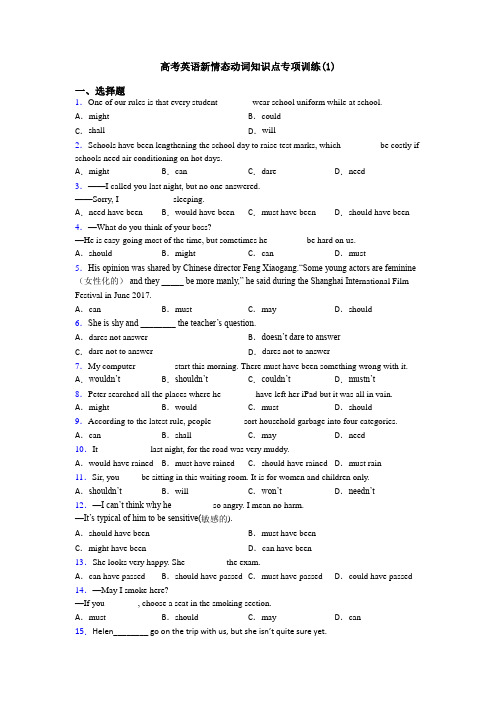
高考英语新情态动词知识点专项训练(1)一、选择题1.One of our rules is that every student _______ wear school uniform while at school. A.might B.couldC.shall D.will2.Schools have been lengthening the school day to raise test marks, which ________ be costly if schools need air conditioning on hot days.A.might B.can C.dare D.need3.——I called you last night, but no one answered.——Sorry, I____________ sleeping.A.need have been B.would have been C.must have been D.should have been 4.—What do you think of your boss?—He is easy-going most of the time, but sometimes he ________ be hard on us.A.should B.might C.can D.must5.His opinion was shared by Chinese director Feng Xiaogang.“Some young actors are feminine (女性化的)and they _____ be more manly,” he said during the Shanghai Inte rnational Film Festival in June 2017.A.can B.must C.may D.should6.She is shy and ________ the teacher’s question.A.dares not answer B.doesn’t dare to answerC.dare not to answer D.dares not to answer7.My computer ________ start this morning. There must have been something wrong with it. A.wouldn’t B.shouldn’t C.couldn’t D.mustn’t8.Peter searched all the places where he________have left her iPad but it was all in vain. A.might B.would C.must D.should 9.According to the latest rule, people _______sort household garbage into four categories. A.can B.shall C.may D.need10.It ___________ last night, for the road was very muddy.A.would have rained B.must have rained C.should have rained D.must rain 11.Sir, you ____ be sitting in this waiting room. It is for women and children only. A.shouldn’t B.will C.won’t D.needn’t12.—I can’t think why he________ so angry. I mean no harm.—It’s typical of him to be sensitive(敏感的).A.should have been B.must have beenC.might have been D.can have been13.She looks very happy. She_________ the exam.A.can have passed B.should have passed C.must have passed D.could have passed 14.—May I smoke here?—If you _______, choose a seat in the smoking section.A.must B.should C.may D.can15.Helen________ go on the trip with us, but she isn’t quite sure yet.A.shall B.may C.must D.can16.The girl _________ out alone at night.A.dare not go B.dare not to go C.dares not go D.not dare go 17.You _________ me about it earlier, but you didn't.A.should have told B.would have toldC.must have told D.should tell18.Tom told us that he ______ come to the party tonight, but he wasn’t sure about this. A.will B.would C.could D.might19.— Did Bob take the job in the supermarket? — No, but I think he _________.A.will have B.may have C.should have D.must have 20.It’s nearly 7 o’clock. Jack ____________ be here at any moment.A.shall B.had toC.ought to D.have to21.—Peter, you delivered a wonderful speech today.—Thanks, but I think I ______ more attention to my stage manners during that time.A.must pay B.should payC.must have paid D.should have paid22.—Jane, why don’t you take a bite of the chocolate?—Well, I am on diet, if you __________know.A.must B.shall C.would D.could23.—Do you know where Tony is?—He _________ in the living room. I saw him there just now.A.shall be B.should have been C.might have been D.must be 24.—Sorry, Mum! I failed the job interview again.—Oh, it's too bad. You________ have made full preparations.A.must B.can C.would D.should25.You ______ have been out last night, for all the lights in your room were not on.A.need B.must C.may D.should【参考答案】***试卷处理标记,请不要删除一、选择题1.C解析:C【解析】【分析】【详解】考查情态动词辨析。
最新初中英语语法知识—情态动词的知识点总复习附答案解析(1)

一、选择题1.It is 11:00 p.m now. Peter hasn't come back yet. His mother ______ be very mad at him. A.may B.can C.must D.need2.Since you are very tired, you ______ finish the work today.A.needn’t B.may not C.mustn’t D.can’t3.I hope you __________ to my birthday party.A.to come B.can come C.comes D.are come4.The designer has tried every possible way to make the robot light, so you _____ worry about its weight.A.must B.may C.can’t D.needn’t5.—Is that cap Bob’s?—No, it ________ be his. His is blue.A.can’t B.mustn’t C.needn’t D.may not6.—I can't stop smoking, doctor.—For your health, I'm afraid you ________.A.must B.can C.may D.need7.—Can I take some milk and biscuits to the reading room?—No, our school has a rule that students _______ eat or drink there.A.can’t B.mustn’t C.needn’t D.may not8.— Mom, I got a big box from express(快递). What is it?—I’m not sure. It ________be a present from your grandmother.A.should B.might C.must D.will 9.—Sorry, Ms Wang. I left my homework at home. Must I hand it in today?—No, you_______ . You_______ bring it here tomorrow.A.mustn’t; should B.needn’t; must C.mustn’t; may D.needn’t; can 10.—Must I finish the work today, Mum?—No, you ________.You can finish it tomorrow.A.mustn't B.can't C.shouldn't D.needn't11.-Could you help me with my English homework, Nancy?-Of course I____________. Glad to help.A.could B.can C.must D.do12.-Mum, must I stay there the whole day?-No, you__________. You__________ come back after lunch, if you like.A.mustn’t; can B.needn’t; mus t C.needn’t; may13.One ______ easily lose his way when he visits or comes to a new place.A.may B.must C.need D.should14.— May I have some wine?— No, you . You have to drive home later.A.shouldn't B.needn't C.mustn't D.may not 15.—________ I borrow the books from the library, Miss Yang?—Sorry, you________. These books are only for members of the English Club.A.Can; couldn’t B.Could; can’tC.Could; couldn’t D.Can; needn’t16.— Must I finish the homework now?— .You can do it later.A.No, you needn’t B.Yes, you must C.No, you can’t17.— Must I go home? — No, you ________.A.can’t B.mustn’t C.don’t D.needn’t18.---I heard they went skating in the mountains last winter.---It ______ true because there was little snow there.A.may not be B.won’t be C.couldn’t be D.will be19.一Hurry up, Mark! Let's cross the road as quickly as possible.一No,you . Don't you see the light is still red?A.couldn't B.wouldn't C.mustn't D.needn't 20.—Could you help me download some Taylor Swift’s songs fr om Ku Gou?—Sorry, people download music from the Internet without paying, because it’s against the law. A.wouldn’t B.needn’tC.mustn’t D.couldn’t21.— Could you play the piano when you were 8 years old?— ________.A.Yes, I could B.No, I can’t C.Yes, I can D.No, I won’t 22.—Jenny, we buy Mom presents. We can clean the house from top to bottom.—Good idea! It’s a special present for Mother’s Day.A.can’t B.mustn’tC.shouldn’t D.needn’t【参考答案】***试卷处理标记,请不要删除一、选择题1.C解析:C【解析】句意:现在11点了,皮特还没有来,他的妈妈一定很生气了。
- 1、下载文档前请自行甄别文档内容的完整性,平台不提供额外的编辑、内容补充、找答案等附加服务。
- 2、"仅部分预览"的文档,不可在线预览部分如存在完整性等问题,可反馈申请退款(可完整预览的文档不适用该条件!)。
- 3、如文档侵犯您的权益,请联系客服反馈,我们会尽快为您处理(人工客服工作时间:9:00-18:30)。
can/be able to区别:
can表示与生俱来的能力或一种客观可能,而 be able to更加强调通过后天的学习和努力获 得的能力,或者在某个客观的场合和背景下, 能做到的事情。
I can’t swim, but I am sure I will be able to swim through more practicing.
______________________________________ ____________
Note:
表示特定的某一过去能力或表示成功地做 了某事时,只能用was/were able to, 不 能用could。
He w__a_s_a_b_l_e_t_oflee Europe before the war broke out.
1) 情态动词 不能单独做谓语,除 ought 和have 外,后面只能接不带to 的 不定式。
2) 情态动词没有人称,数的变化,但有些 情态动词,如can、will也有一般式和过去式 的变化。 3) 情态动词的“时态”形式并不是时间区 别的主要标志,不少情况下,情态动词的现 在式形式和过去式形式都可用来表示现在时 间、过去时间和将来时间。 ______________________________________
三、情 态 动 词 的 多 样 性
______________________________________ ____________
四、情态动词试题的突破方法
1.首先从整体上把握情态动词的语法和语义特征。 2.逐个学习,了解每个情态动词的用法特征,尤其要熟练掌握一些 常用或常考情态动词的基本用法并认真区别具有相同功能的、意思相近 的情态动词的用法。
①can 和could:
1.can
1)表能力 can表能力时意味着凭体力或脑力或技术
等可以无甚阻力地去做某事。
I can climb this pole. He is only four , but he can read.
______________________________________ ____________
____________
二.情态动词的语法功能
(1). We use modal verbs to talk about:
1. Ability (能力) 2. Obligation (义务) 3. Certainty (可能性) 4. Permission (允许)
______________________________________ ____________
____________
The usage of some common modal verbs
情态动词
1. can could be able to 2. may might 3. shall 4. must have to 5. 情态动词+have done
______________________________________ ____________
2. She _c_a_n__ speak both English and French.
______________________________________ ____________
①The police still haven’t found the lost child, but they’re doing all they can.
警察还没有找到丢失的孩子, 但是他们正在竭尽全力地寻 找。(现在的能力)
②If you have a good sleep, you will be able to work out this problem.(将来的能力)
______________________________________ ____________
五、情态动词试题的解题技巧
______________________________________ ____________
六.常见情态动词的基本用法
1. can could be able to 2. may might 3. will would 情态动词 4. shall 5. must have to 6. ought to should 7. need dare 8. 情态动词+have done ______________________________________
What’s the definition of modal verbs?
情态动词是一种本身有一定的词义,表 示说话人的情绪,态度或语气的动词,但 不能单独作谓语, 只能和其他动词原形 构成谓语。
______________________________________ ____________
一.情态动词的语法特征
(2).We also use modal verbs to:
5. Make requests(提出请求) 6. Make suggestions(提出建议) 7. Make offers(提供帮助) 8. Give advice(提出意见)
______________________________________ ____________
______________________________________ ____________
1.A big fire broke out in ABC hotel yesterday. Luckily, everyone __w_a_s_a_bl_e_t_o_ run out of the building.
1.表示现在的能力: can,am/is/are able to 2.表示将来的能力:
will be able to 3.表示过去的能力: could,was/were able to 4.表示过去本来能做未做的能力_________________________ ____________
